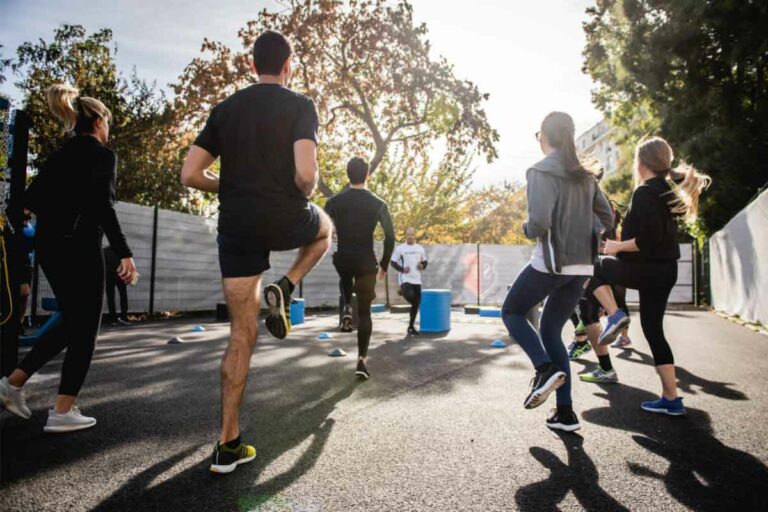Running On An Empty Stomach? Does It Support Weight Loss?

If you have recently got into running or are a beginner, you may have heard people talking about whether you should run on an empty stomach to support weight loss.
There is some debate about this in the running community: is running on an empty stomach good or bad?
Some runners tend to run on an unfed stomach due to competition nerves. Others suggest it makes their performance better.
A scientific look at the subject, however, can reveal the truth. We can learn whether an empty stomach is BAD for our practice or if it can BOOST our performance. Or maybe both are positive.
We investigated, so you don’t have to. See if exercising on an empty stomach will increase your performance.
What Do We Mean by Running on an Empty Stomach?
Running on an empty stomach and fasted running are similar concepts, but they are not necessarily the same thing.
Running on an empty stomach generally means running when you haven’t recently eaten, usually after a night’s sleep. It doesn’t necessarily mean a specific fasting strategy.
For example, you run first thing in the morning before breakfast, or in the early evening when you have yet to consume a significant meal.
Proper hydration for a morning run is vital, as running dehydrated can be harmful.
Fasted running is a more specific approach. It involves intentionally staying with no food for some time. It involves intentionally staying with no food for some time. The idea is that the body uses more fat as energy because carbohydrate stores are low.
Fasted running is often associated with extended periods without food and may involve strategies like intermittent fasting.
Can Running on an Empty Stomach Support Weight Loss?
Running without having eaten is popular primarily for its claimed fat-burning benefits.
It is suggested that as a result of low glycogen levels, your body will CONSUME your fat stores more readily, leading to more effective fat loss.
It’s unclear from the scientific research if this is a placebo effect caused by hunger or if there is scientific evidence that this does occur.
While it makes theoretical sense that exercising on an unfed stomach could lead to great fat loss, the research can be conflicting.
Some studies suggest that running before breakfast may help you lose more weight. However, other studies state that it remains unclear whether training in a fasted state leads to more significant weight loss.
One study found that those with a correctly balanced meal before running burned more calories than those who exercised on an unfed stomach.
The Healthline has a good discussion of fasted cardio’s pros and cons in its article. It came to a conclusion:
- Don’t exercise without eating for more than 60 minutes when trying fasted cardio.
- Choose low- to moderate-intensity workouts.
- Drinking water is part of fasted cardio, so stay hydrated.
- Lifestyle factors, such as nutrition, play a much more significant role in weight gain or loss than workout timing.
- You should listen to your body and do what feels right for you.
So, according to the research, there is no hard evidence to support the link between exercising with an empty belly and fat loss in an obvious way.
Weight loss likely occurs due to a calorie deficit, whether exercise is done on an empty stomach or not.
It’s clear that more research is needed on this topic to really understand what’s going on.
Benefits of Running on an Empty Stomach
There can be scientifically reputable evidence that suggests there are some benefits to running with an empty belly.

1. Reduced Nausea And Stomach Issues
Some people find that when they run they can get stomach cramps, digestion problems, and even diarrhea and vomiting in extreme situations.
If you train for long periods of time, such as a long-distance runner, then you will experience this often.
Running with no food in your system can certainly help with this.
2. Wasting Energy
Some people, particularly those who run long distances, find that eating before they run can be a little pointless. They will end up wasting the energy they just consumed pretty quickly while it isn’t necessary to do so.
This is true, and in these cases consider using energy gels or other food supplements to give you the energy you need but without wasting good food.
Disadvantages Of Running on an Empty Stomach
There are certainly disadvantages to running with no food in your system.
1. Training Intensity Reduced
Sure, when you train on an empty stomach your body will naturally go into your fat stores due to reduced glycogen levels.
However, this means that your intensity will be significantly reduced, which means that you won’t be able to run for longer.
Eat before you run and you can run for longer and further.
2. Injury Risk
There is a large risk of injury when you don’t eat before running.
The more fatigued your body is and the harder it is for it to recall energy, the more likely it is for things to sprain, etc.
Your brain also needs glycogen levels to be normal for proper function so can actually be dangerous for trips and such.
3. High Cortisol And Muscle Loss
When you wake up, your cortisol levels are at their highest.
Cortisol is a hormone that will contribute to muscle breakdown and weakness as a result of other functions this hormone controls.
Moreover, these cortisol levels will be elevated further during overnight periods of not eating.
Therefore, running with an empty belly in the morning can lead to muscle loss and general weakness.
4. Risking Conditions
Certain conditions mean exercise without food in your system can be a complete no zone. You can end up having low blood sugar levels in a state of hunger. When this occurs, running can be very dangerous.
Frequently Asked Questions
Does Running on an Empty Stomach Help Burn Fat?
Running without having eaten is a controversial topic when it comes to burning fat. Some people believe that running before breakfast can promote fat burning. In contrast, others argue that it doesn’t make a significant difference. Let’s explore the pros and cons.
What Happens When You Run on an Empty Stomach?
When you run in a state of hunger, your body doesn’t have its usual glycogen stores to rely on for energy. Instead, it depletes muscle glycogen and uses stored fat for fuel. This can lead to greater fat oxidation during your run.
Is It Beneficial to Run in the Morning on an Empty Stomach?
Running in the morning on an empty stomach can be beneficial if you’re trying to lose weight. When your body’s levels of insulin are lower in the morning, it’s more likely to use stored fat as a source of energy during your run.
Are There Any Drawbacks to Running on an Empty Stomach?
Running on an empty stomach may not be suitable for everyone. Running without fuel can decrease performance and risk of losing muscle if you plan on a high-intensity or long-duration workout.
Can Working Out on an Empty Stomach Help Me Lose Fat?
Running without food in your system can contribute to weight loss, but it’s not a magic solution. It would help if you were calorie deficient through exercise and a balanced diet to lose fat.
Does Running on an Empty Stomach Affect My Overall Health?
Running without having eaten doesn’t significantly impact your overall health. However, listening to your body and ensuring you’re fueling correctly for optimal performance and recovery is essential.
Does Running on an Empty Stomach Lead to Muscle Loss?
Running without having eaten can lead to muscle loss, mainly if you’re doing high-intensity workouts. Your body may break down muscle tissue for energy if it doesn’t have sufficient glycogen stores.
When Is the Best Time to Run on an Empty Stomach?
The best time to run on an empty stomach is before breakfast. This allows your body to use stored fat as an energy source and can help kickstart your metabolism for the day.
Does Running on an Empty Stomach Increase Endurance?
Running before breakfast or without breakfast may increase endurance for some people. When your body relies on fat for fuel, it can improve your body’s ability to use stored energy efficiently, potentially enhancing endurance.
Can I Do High-Intensity Workouts on an Empty Stomach?
High-intensity workouts require more immediate energy, often supplied by glycogen stores. Running on an unfed stomach may not provide enough readily available glucose for optimal performance during high-intensity exercises.
The Bottom Line
No one method works for everyone. Not everyone wants to eat before a run; that’s totally fine.
- Consider doing a much lighter run or jog if you choose not to eat before heading out.
- Consider eating something small or something like a food supplement drink before running to reduce nausea.
If you want the best performance and safety, you should probably have something in your stomach.






